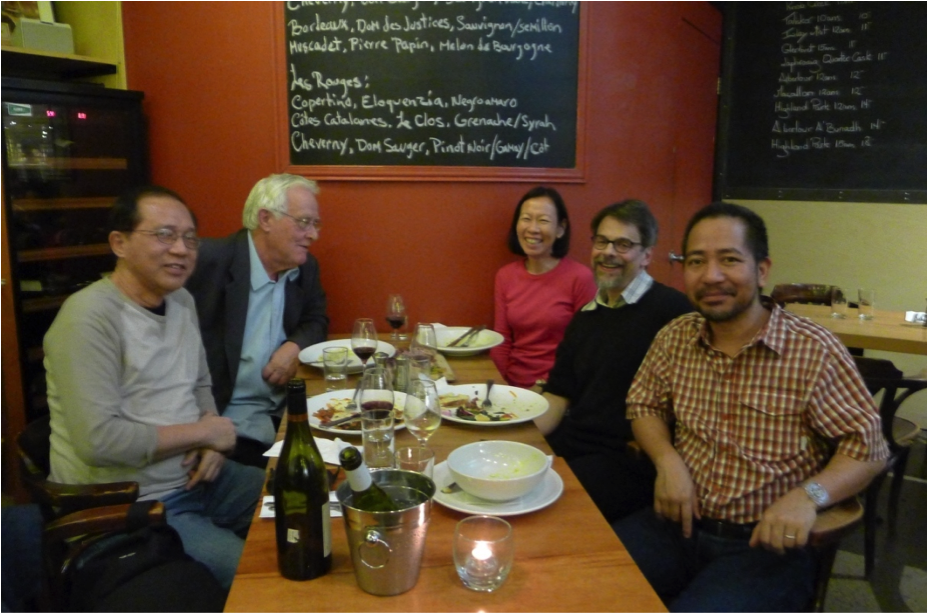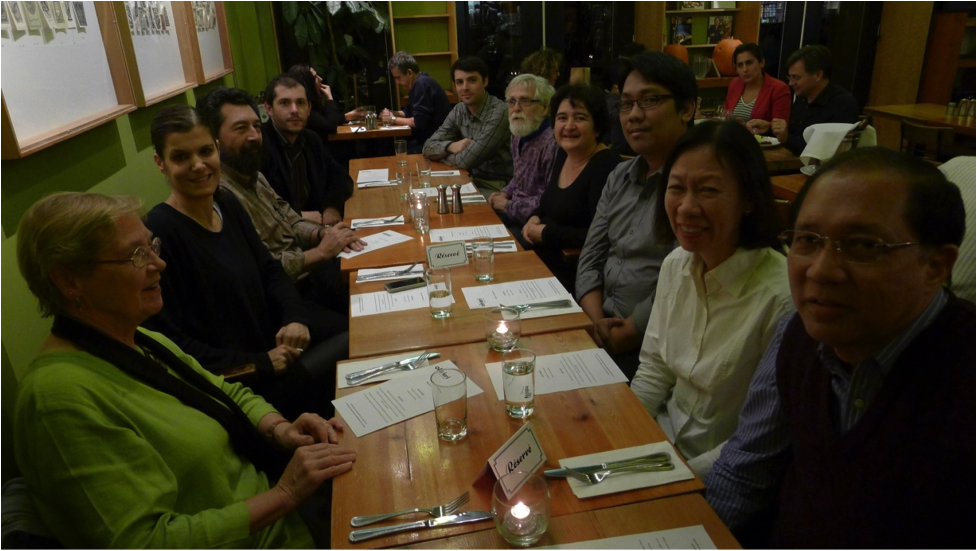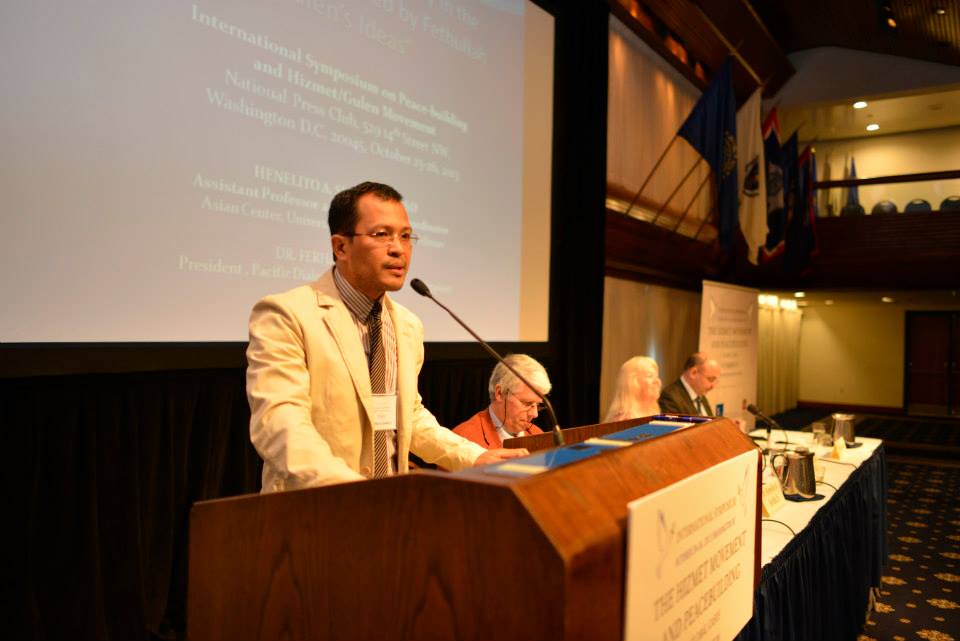 Dr. Eduardo C. Tadem, Professor at the Asian Center, traveled to Montréal, Québec, Canada to take part in two separate conferences between October 17 and 23.
Dr. Eduardo C. Tadem, Professor at the Asian Center, traveled to Montréal, Québec, Canada to take part in two separate conferences between October 17 and 23.
Dr. Tadem chaired the panel on ‘Regionalism in Southeast Asia: Geopolitical Conflicts and Financial Cooperation’ at the 31st Conference of the Canadian Council for Southeast Asian Studies (CCSEAS), which was held from October 17 to 19 at the Université de Montréal. Benedict Anderson (Professor Emeritus at Cornell University) and Saturnino “Jun” Borras (Associate Professor at the Institute of Social Studies at the Hague) were the keynote speakers.
About 120 participants from Southeast Asia, Canada, Europe and the United attended the conference.
PHOTO (clockwise from left): Dr. Ed Tadem, Professor Benedict Anderson, Dr. Tesa Tadem, and Dr. Saturnino “Jun” Borras.
 Later in the week, Dr. Tadem presented his paper, ‘Land Appropriations in the Philippines: The Case of the Sacobia Area and the Clark Special Economic Zone’ at the Colloquium on Looting and Sharing: New Forms of Appropriation of Resources and Territories, which was held from October 21 to 23, 2013 at the Université de Montréal and Université du Québec à Montréal.
Later in the week, Dr. Tadem presented his paper, ‘Land Appropriations in the Philippines: The Case of the Sacobia Area and the Clark Special Economic Zone’ at the Colloquium on Looting and Sharing: New Forms of Appropriation of Resources and Territories, which was held from October 21 to 23, 2013 at the Université de Montréal and Université du Québec à Montréal.
In his paper, Dr. Tadem described how the Special Economic Zone in Clark, Pampanga has encroached on lands occupied by indigenous Ayta and lowland settler communities. The Aytas had received a Certificate of Ancestral Domain Title (CADT) but the Clark Development Authority unilaterally declared the said land as a special economic zone, entering a Joint Management Agreement with the communities’ tribal association and luring various investors. This, however, is a decision that some Aytas are questioning; they are also calling for the JMA's abrogation.
The Colloquium was organized by the Center interdisciplinaire de recherche en développement international et société (CIRDIS) at the University of Quebec in Montreal and the Centre for East Asia Studies (CÉTASE) of the University of Montreal.
The participation of UP faculty and research staff in these two aforementioned events is part of the implementation of the provisions of the Memorandum of Agreement between the University of the Philippines and the Université de Montréal. Dr. Eduardo Tadem was accompanied by Dr. Tesa Tadem, Professor of Political Science and Joel Ariate, Managing Editor of the journal Kasarinlan. Both are from the University of the Philippines Diliman.
PHOTO: Farewell dinner hosted by the organizing committee for participants from Southeast Asia, Africa, and Latin America. On the right of Dr. Eduardo Tadem are Dr. Tesa Tadem and Joel Ariate.
 Dr. Henelito A. Sevilla, Jr. flew to Washington, D.C. to attend an international symposium, ‘Hizmet Movement and Peacebuilding: Global Cases,’ which was held from October 24 to 26, 2013 at the National Press Club.
Dr. Henelito A. Sevilla, Jr. flew to Washington, D.C. to attend an international symposium, ‘Hizmet Movement and Peacebuilding: Global Cases,’ which was held from October 24 to 26, 2013 at the National Press Club.
Assistant Professor at the Asian Center, Dr. Sevilla presented his paper, ’Turkish Active Diplomacy in the Philippines as Inspired by Fethullah Gulen’s Ideas, which was part of a panel on Peacebuilding in Regional Perspective. He discussed three ways Turkey is bridging existing and unexplored opportunities to improve and maximize diplomatic and cultural ties between Turkey and the Philippines. First is the opening of Turkish-owned schools in Manila and Zamboanga city, south of the Philippine capital; second is the creation of the Pacific Dialogue Foundation by both Turkish and Filipino citizens; lastly is the establishment of the Philippine-Turkish Chamber of Commerce. In all three cases, Dr. Sevilla discussed the influence of Fethullah Gulen’s ideas; the promotion of Turkish interests in the Philippines and vice versa; and the challenges and opportunities faced by both countries as they improve diplomatic, business, and cultural linkages.
According to the conference description, the Hizmet (Gulen) Movement has been involved in peacebuilding efforts and has ‘established educational and communal organizations and institutions in over 140 countries, most of which suffer from internal conflicts and communal divisions.’ The conference drew several presenters from Europe, Africa, and East Asia.
The conference is supported by the Turkish Review and the Woodstock Theological Center at Georgetown University, among other institutions.
Dr. Sevilla also visited the Turkish-American Alliance, the Middle East Institute, and the Rumi Forum.
PHOTO: Dr. Sevilla presenting his paper at the Hizmet Movement and Peacebuilding: Global Cases symposium.

